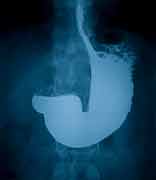Increased risk for children aged younger than 1 and for those aged 1 to 17 years
TUESDAY, June 23, 2015 (HealthDay News) — Use of acid suppression medication is associated with increased risk of Clostridium difficile infection (CDI) in infants and children, according to a study published online June 9 in Clinical Infectious Diseases.
Daniel E. Freedberg, M.D., from the Columbia University Medical Center in New York City, and colleagues examined the correlation between acid suppression medication and incident CDI in children. Six hundred fifty patients aged 0 to 17 years with at least three visits and at least one year of follow-up time in the dataset with codes for CDI were matched in a 1:5 ratio with 3,200 controls by age, sex, The Health Improvement Network practice, time of entry into dataset, and follow-up time.
The researchers found that acid suppression medication correlated with CDI, with an adjusted odds ratio of 7.66. In infants aged younger than 1 year and children aged 1 to 17 years, acid suppression medication correlated with CDI (adjusted odds ratios, 5.24 and 9.33, respectively). The risk for CDI was significantly increased for proton pump inhibitors versus histamine-2 receptor antagonists and for recent versus distant exposure.
“Acid suppression medication was associated with CDI in infants and children in the outpatient setting, with an effect based on medication timing,” the authors write. “Increased risk for CDI should be factored into the decision to use acid suppression medication in children.”
Copyright © 2015 HealthDay. All rights reserved.








